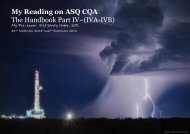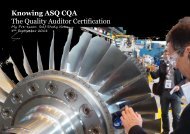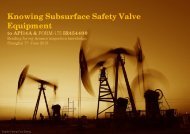My Reading on ASQ CQA HB Part I-IA~IE-s
You also want an ePaper? Increase the reach of your titles
YUMPU automatically turns print PDFs into web optimized ePapers that Google loves.
<strong>Part</strong> IE1<br />
When Illegal or Unethical Activities Are Detected<br />
An auditor finding evidence of wr<strong>on</strong>gdoing, whether within or outside the scope of an audit assignment, has an<br />
ethical duty to bring the matter to the attenti<strong>on</strong> of the client and appropriate management for acti<strong>on</strong>. The auditor<br />
should keep a record of such matters, safeguard the evidence, and obtain copies of pertinent documents and<br />
records (if necessary). The auditor must be aware of and apply the ethics of the professi<strong>on</strong> and the law in this<br />
regard. An auditor may ask the client about the company’s ethics policy and ethics department prior to<br />
accepting the audit. If an ethics department exists, it may be a valuable resource if potentially unethical<br />
situati<strong>on</strong>s surface before, during, or after an audit.<br />
Management will take appropriate acti<strong>on</strong> <strong>on</strong> illegal or unethical activities within the company. This may involve<br />
legal acti<strong>on</strong> of some type and the involvement of the auditor. Auditors should be aware of their legal<br />
resp<strong>on</strong>sibilities and rights under the law, including whistle- blower laws.<br />
If management sp<strong>on</strong>sors allegedly illegal activities, either internally or externally, the auditor’s employment may<br />
be threatened. An auditor should have access to legal counsel to resolve questi<strong>on</strong>able issues. Often that legal<br />
counsel is best if it comes from outside the company. The U.S. C<strong>on</strong>gress and various states have passed laws<br />
protecting people who report incidents of wr<strong>on</strong>gdoing, including waste, fraud, and abuse (see a list of these<br />
laws at http://www.ncsl.org/issues-research/labor/state-whistleblower-laws.aspx ). These whistle- blower<br />
statutes (see Figure 5.3 for examples) protect auditors and others. Questi<strong>on</strong>s about specific laws should be<br />
directed to the appropriate federal, state, or local authorities (see Figure 5.4 for an example of a local<br />
regulati<strong>on</strong>). Please note that Figures 5.3 and 5.4 are provided as examples and may be dated. An auditor faced<br />
with a potential whistle- blower situati<strong>on</strong> should seek the latest informati<strong>on</strong> available. It is sufficient to say that<br />
whistle- blowers have some protecti<strong>on</strong> under both federal and some state laws; however, the amount of<br />
protecti<strong>on</strong> and how it is applied depend <strong>on</strong> each situati<strong>on</strong>.<br />
Charlie Ch<strong>on</strong>g/ Fi<strong>on</strong> Zhang

















